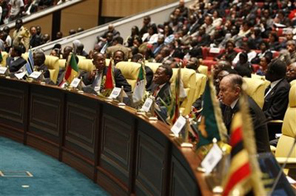Libya to lead AU
SIRTE: Concluding marathon talks held late into the night, African leaders agreed Friday to a Libyan-driven push to transform the African Union and in theory greatly extend its powers.
The change was materialized by morphing the African Union's executive body, the commission, into an "African Authority."
The draft document adopted at 4 a.m. at the AU summit of heads of states in Sirte, Libya, showed that the new Authority would simplify the AU's structure and boost its power over defense, diplomatic and international trade matters.
The document, obtained by The Associated Press, was viewed as a milestone for the buildup to what Libyan leader Moammar Gadhafi has long envisioned as a federal government overseeing a "United States of Africa."
"The final text reflects everybody's position," said Benin's Foreign Minister Jean-Marie Ehouzou, the only head of state or country delegate to address journalists as the weary-eyed and tightlipped officials trickled out of the conference room after over 15 hours of near-uninterrupted talks.
The Authority would have to resolve doubts voiced by many African leaders about unifying Africa under one government, including concerns about national sovereignty, division of resources and power.
Most African leaders voice support for more unity, but some of the continent's wealthier nations, led by Nigeria and South Africa, had appeared to be resisting the move. African diplomats say there are worries the new structure could become overbearing, especially if it is led by Gadhafi, who has a long history of intervening throughout Africa.
Ehouzou conceded the final declaration had "provoked quite a few sharp discussions, but I believe the states eventually managed to reach common ground nonetheless."
The draft shows the new Authority will "coordinate the implementation of a common defense policy" as well as the "common position of AU member states during international negotiations." The Authority is also due to hold "the strategic command of an African force in waiting."
"I believe (African) states are ready to drop a little bit of their sovereignty in favor of the authority," Ehouzou said.
In practice, however, the wording of the Authority's new role remained very vague. Ehouzou also confirmed that the changes would have to be first written into the AU's constitution before being ratified by the parliament of each of the AU's 53 member states. The declaration showed that finances related to the change were also to be studied at a later, unspecified date.






